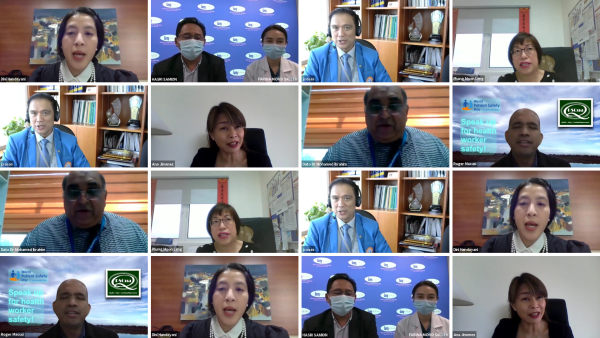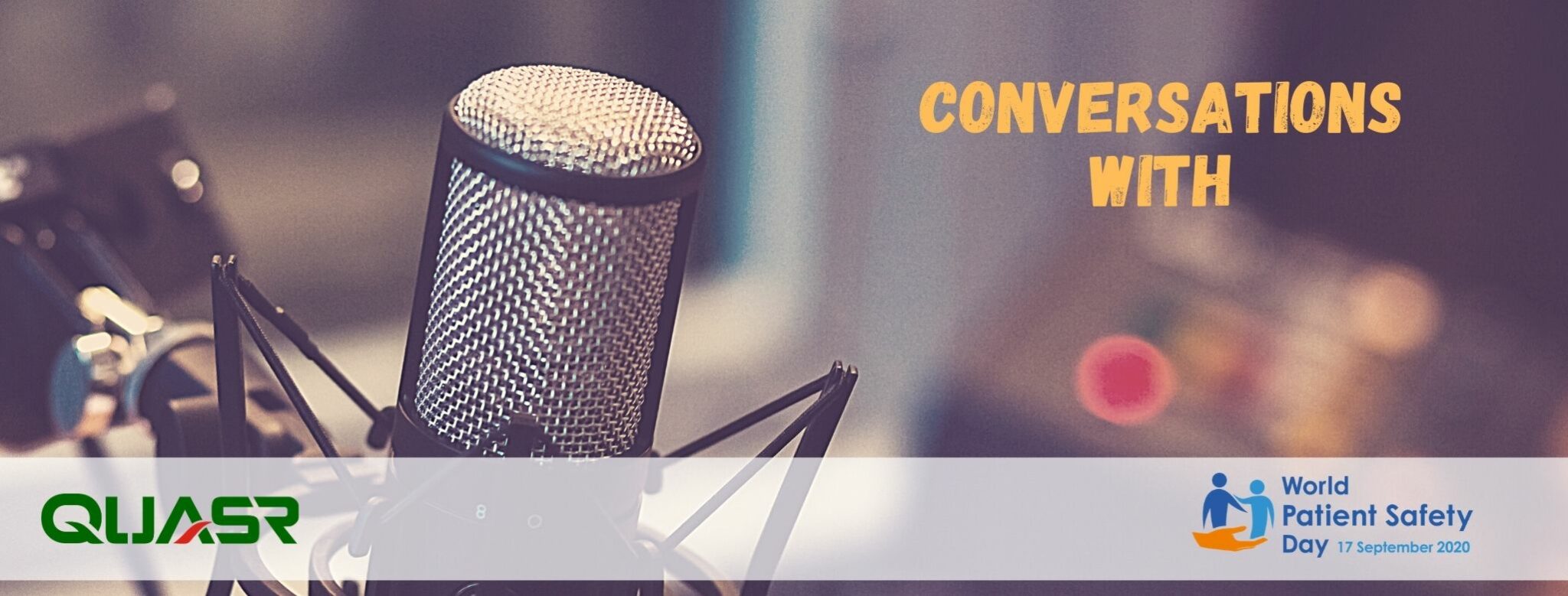In conjunction with World Patient Safety Day (WPSD) 2020, QUASR is organizing a series of interviews with healthcare leaders to share their thoughts and to join the call for action to protect and support health workers. Our final interview in the series is with Dr. Hasri Samion and Dr. Farina Mohd Salleh from the National Heart Institute of Malaysia (IJN).
Dr Hasri Samion, MD, M.Med, FNHAM, FAsCC is the Chief Clinical Officer & Senior Consultant Paediatric Cardiologist, IJN. Dr Hasri’s specialities are Paediatric Cardiology, Interventional paediatric cardiology and Paediatric electrophysiology and pacing.
Dr Farina Mohd Salleh, M, M.Med is the Director of Quality and Emergency Physician & Manager, Observation & Emergency Department, IJN. Dr Farina is the Chair of Quality & Patient Safety Committee and Chair of Medication Safety Group in IJN. Prior to joining IJN in 2015, Dr Farina was an Emergency Physician at the Emergency & Trauma Department, Sungai Buloh Hospital. She is a recipient of Excellent Service Award from Ministry of Health Malaysia.
In this interview, Dr. Hasri and Dr. Farina share with us IJN’s safety culture and its roles and experience in managing patient and staff safety during this pandemic as a tertiary referral heart center. While it is important to be prepared for a crisis, being able to adapt quickly to new diseases and changing environment is just as crucial. Last but not the least, a valuable lesson learned is taking the opportunity during the lockdown period when the patient load was low to improve and redesign processes. This is an approach another hospital can emulate.
We take this opportunity to thank Dr Hasri and Dr Farina for their generous sharing.
Here is a video excerpt from the interview with Dr. Hasri and Dr. Farina
On health worker safety
Dr Hasri believes that staff safety should be within the patient safety framework and patient safety initiatives. Without healthy staff, patient safety initiatives could not be successfully implemented. Achieving health work safety is also a shared responsibility of all health workers, while management should give full support to provide a safe working environment throughout the organisation.
“Staff safety should be within the patient safety framework”
On protecting staff from safety risks, Dr Hasri’s view is that all healthcare organisations should set up an occupational safety & health (OSH) unit to look after staff safety and wellbeing. At the same time, staff at all levels of care need to be aware of the risk of infections. There are several ways to ensure staff safety during a pandemic, such as through education and training, proper and adequate PPE, screening and testing, staff engagement, effective communication and continuous support from the leadership team.
IJN’s safety culture
Safety culture is not something that can happen overnight, said Dr Farina. It is cultivated over many years, not only to reach a certain level of safety culture, but also to nurture new staff into the organisation’s culture. It is a continuous process. For IJN, the basic quality and safety structure should include local and international accreditations. That is the baseline or reference point for IJN in terms of how safety is practiced all over the world. We want to standardise safety processes and adopt best practices in IJN, said Dr Farina.
“Knowing your weaknesses, addressing them, working together on process improvement, analysing data and continuously improving. That is the safety culture in IJN”
According to Dr Farina, it is very important to have a single culture of safety – something simple and everyone understands the principles. A safety culture should trickle down from the top, with support from the management team down to every staff, whether they are clinical or non-clinical. IJN has specific goals for patient safety that include elements of staff safety as well.
Having a healthy environment, adequate and skilled manpower, clear responsibility for care givers and effective communication, as well as creating the concept of shared patients, are essential to delivering safe and good quality care, added Dr Hasri.
Initial response to Covid-19, reopening and new norm
IJN has an infection control committee (ICC) that conducts regular surveillance of any acquired infections in the hospital. When Covid-19 cases first surfaced in Malaysia, IJN set up a task force to focus on containment and early detection processes, as well as setting up screening and testing facilities for patients. The next step was educating staff on appropriate PPE, planning for manpower needs, expanding the ICC team and ensuring new operating procedures are in place.
When IJN realised there was community spread and some patients and staff were infected and others were exposed to Covid-19, management raised the level of alert, tightened safety control, adjusted work schedules and deferred elective procedures. The volume of clinical services and patient load went down significantly during the Movement Restriction Order (MCO) period. During this lockdown period, processes were improved and adjusted to the new norm, which put IJN in good stead for the reopening as movement restrictions were gradually lifted. As the country is facing the third wave, IJN is now working on the next level of preparation to mitigate the risk of virus infection in the hospital. Dr Hasri said that as 70% Covid-19 cases are asymptomatic, staying vigilant, compliance to safety procedures and keeping good habits are the responsibility of everyone. “We conduct regular observations and audits, share findings with the respective wards and departments so that people are aware of the issues and risks”. IJN’s current staff compliance rate is around 80% and the adherence rate is getting better.
A Covid-19 designated hospital for patients with heart conditions
In Malaysia, all Covid-19 cases are treated in designated Ministry of Health (MOH) hospitals. IJN is an exception. As the tertiary referral heart centre, IJN was asked by the ministry to be part of the Covid-19 team, as there are patients with heart conditions and are suspected of being infected by Covid-19. Symptoms such as chest pains are similar to Covid-19 symptoms. In-house Covid-19 detection PCR and Rapid Kit) are available to triage patients. “The need for treating patients with heart conditions is greater and more urgent than the risk of Covid-19 infection”, said Dr Hasri. Once the heart conditions have stabilised, the patients will be transferred to the nearby Hospital Kuala Lumpur. If the initial admission is suspected to be heart conditions, but later diagnosed to be otherwise, the patient will be transferred to a designated MOH hospital.
“The need for treating patients with heart conditions is greater and more urgent than the risk of Covid-19 infection”
Paying tributes to front liners
The Covid-19 pandemic has exposed health workers to increased workplace safety risks, including mental health and well-being. In this aspect, IJN management has been proactive in providing emotional support to staff, particularly those who respond poorly to stress and need more support. “What our management did was immediately form support groups and pre-emptively go to areas where people are at higher risk of getting infected”. The support groups, which includes senior staff members, provide counselling and address individuals with poor coping mechanism and high stress levels, Dr Farina said.
In conjunction with WPSD, IJN organised various online activities, including online games with prizes, to celebrate WPSD and pay tribute to staff and frontline workers. The first ever Patient Safety Awards were given to staff who contributed the most to patient safety. IJN management also sent out emails with pictures and messages to the swab teams, infection control, patient support, nursing and some other new teams created to manage Covid-19. Positive messages from IJN management is a way of paying tributes and showing appreciation to staff and front liners, as well as to boost staff morale.
JCI and MSQH accreditations
IJN is a JCI and Malaysian Society for Quality in Healthcare (MSQH) accredited hospital. Both accreditations are useful for safe and efficient operation of hospital, said Dr Farina. In particular, there is a chapter on global communicable diseases added into JCI’s latest edition last year. “It was as though they predicted something like this would happen. I’m quite amazed it came at a timely manner”. We had plans and drills but did not expect the pandemic to be at this magnitude, said Dr Farina.
Apart from having policies and SOP in place, Dr Farina thinks that an organisation’s ability to adapt quickly to new diseases and crisis, and to find new ways of handling the situation, is equally important. What IJN did this time was to review existing policies and develop multiple new workflows to for various scenarios. This expanded manual is useful for future references, Dr Farina said.
“Apart from policies, the adaptability of the organisation to new diseases, new requirements and new ways of handling them is just as crucial”
Lessons learned
The pandemic has highlighted the importance of being prepared for crisis, working as a team and looking out for any potential risk in healthcare. We need to continuously communicate and engage with staff and patients to understand their needs and be ready to offer options when crisis happens. That is the main takeaway for Dr Hasri.
“IJN had taken the initiatives to improve workflow and processes on patient journey during the initial strict lockdown period when patient load was low”
New process improvements were implemented during the initial lockdown and improvised quickly for both Covid and non-Covid related processes. “I think this is a good lesson learned and a good tactic. Some hospitals might have felt the shock and when hospitals reopened found themselves unprepared. We took the opportunity and made ourselves well-prepared when MCO was lifted”, said Dr Farina with a sense of pride. What motivates her team? “Patients need us. Heart diseases don’t go away because of Covid-19. IJN is the tertiary referral heart centre and patients don’t have anywhere else to go. We need safe processes in place and be ready to receive patients”, is her earnest response.



